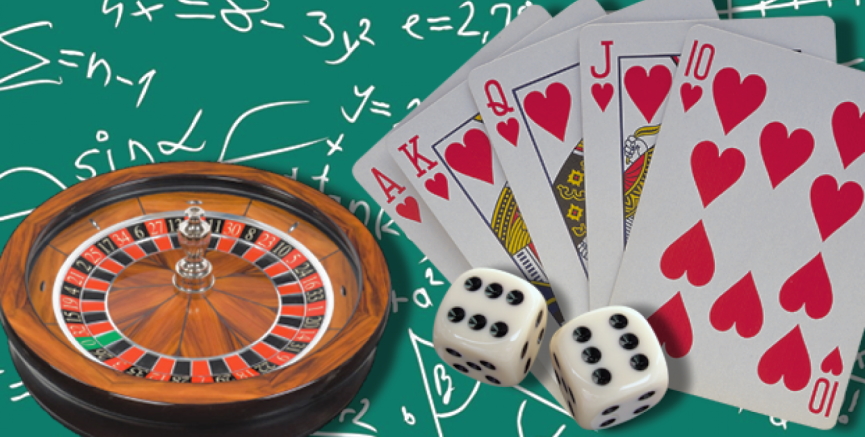Whether you’re rolling dice, spinning a roulette wheel, or calculating poker odds, there’s one constant behind every bet—mathematics. Understanding gambling mathematics can transform your approach to casino games, sports betting, and even online gaming. While chance plays a significant role, the numbers never lie—and smart gamblers use them to their advantage.
In this article, we’ll break down the key concepts of gambling mathematics, including probability, house edge, expected value, and variance, and how they influence every game of chance.
🎲 What Is Gambling Mathematics?

Gambling mathematics is the study of probability and statistical analysis applied to games of chance. It helps players understand:
-
Odds and probabilities
-
Risk and reward
-
Long-term expectations
-
How casinos maintain profit margins
Whether you’re a casual player or an aspiring professional, knowing the math behind the games can improve decision-making and reduce costly mistakes.
📊 Key Concepts in Gambling Math
Let’s look at the most essential gambling math principles:
✅ 1. Probability
Probability is the chance of an event happening, expressed as a number between 0 and 1 (or 0% to 100%).
For example:
-
Rolling a 6 on a standard die = 1/6 ≈ 16.67%
-
Drawing an ace from a standard deck = 4/52 ≈ 7.69%
Knowing the likelihood of outcomes helps you understand when you’re facing good or bad odds.
✅ 2. Odds
Odds express the ratio of success to failure. There are different ways to represent odds:
-
Fractional Odds (e.g., 5/1)
-
Decimal Odds (e.g., 6.00)
-
Moneyline Odds (e.g., +500 or –200)
Understanding how odds are calculated helps in sports betting and payout comparisons.
✅ 3. House Edge
The house edge is the casino’s built-in advantage on a game, typically expressed as a percentage.
Examples:
-
Blackjack (with basic strategy): ~0.5% house edge
-
Roulette (European): ~2.7%
-
Slot machines: 2%–10% (varies widely)
Even if you win in the short term, the math favors the house over time. The lower the house edge, the better for the player.
✅ 4. Expected Value (EV)
Expected Value is a measure of what you can expect to win or lose on average per bet.
EV = (Probability of Win × Payout) – (Probability of Loss × Bet Amount)
A positive EV (+EV) means a bet is profitable in the long run. A negative EV (–EV) means you’re expected to lose over time.
🧮 Example:
Bet $10 on a coin flip with a $25 payout for heads and nothing for tails.
-
EV = (0.5 × $25) – (0.5 × $10) = $12.50 – $5 = +$7.50
This is a profitable bet.
✅ 5. Variance and Volatility
Variance measures how much results deviate from the expected value in the short term. Games with high variance (like slots or poker tournaments) can have big swings—both wins and losses.
Low variance games (like blackjack with flat betting) have more predictable outcomes, but usually smaller payouts.
🧠 Using Math to Choose the Right Games
Here’s how math can guide smart gambling choices:
| Game | House Edge | Skill Factor | Variance |
|---|---|---|---|
| Blackjack | Low (0.5%) | High | Low to Medium |
| Roulette (Euro) | Medium (2.7%) | None | Medium |
| Slots | High (2%–10%) | None | High |
| Poker | Variable | Very High | High |
| Sports Betting | Varies (vig) | High (in-depth) | Medium to High |
| Baccarat | Low (~1.06%) | Minimal | Low |
To minimize losses or improve chances of winning:
-
Play games with low house edge
-
Avoid bets with negative expected value
-
Learn strategy for skill-based games (e.g., blackjack, poker)
🎯 Card Counting and Strategy
In games like blackjack, players can use probability and card counting to shift the odds slightly in their favor. While not illegal, card counting is frowned upon by casinos and can get you banned.
Similarly, in poker, players use game theory, expected value, and opponent modeling to make mathematically sound decisions.
📈 Risk Management for Gamblers
Even with solid math knowledge, bankroll management is key:
-
Set betting limits
-
Use a staking plan (e.g., flat betting, percentage betting)
-
Avoid chasing losses
-
Accept variance—don’t expect to win every session
📉 The Gambler’s Fallacy
A common mistake is assuming that past outcomes influence future ones. For example:
“If the roulette wheel has landed on red five times, black is due.”
This is false—each spin is independent. The math always resets.
Avoid this fallacy by relying on probabilities, not patterns.
🏁 Conclusion: Beat the Odds with Knowledge
While no system can guarantee consistent winnings, understanding gambling mathematics gives you a critical edge. From calculating expected value to selecting games with favorable odds, the numbers help you make informed decisions, manage your fatcai99 bankroll, and enjoy gambling responsibly.
🎰 Remember, smart gambling isn’t about luck—it’s about knowing the math behind the games.